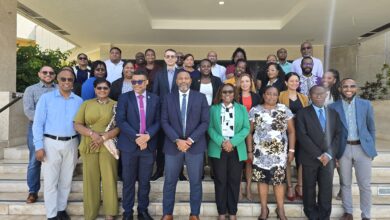Mr. Chairman,
Honourable Ministers,
Members of the Diplomatic Corps,
Officials of Member States
Representatives of Regional and International Organisations
Distinguished guests
Staff of the CARICOM Secretariat
Ladies and Gentlemen:
Good Morning.
It is my pleasure to welcome you all on behalf of the Secretary-General and on behalf of the Secretariat as a whole. My welcome to you to the Headquarters of the Community is both warm and collegial. I thank those of you from overseas, especially those who have come from the farthest reaches of the Community to contribute to the success of the work of this Council.
This Meeting of the COHSOD is central to a very busy period for us at the Secretariat. It has been preceded by Meetings of Officials on Consumer Affairs and on Technical and Vocational Education and a Special Meeting of the Ministers on the Rights of the Child. COHSOD VII will be followed by meetings of the Pan Caribbean Partnership against HIV/AIDS and the Coordinators of the National HIV/AIDS Programme with CAREC as well as a workshop on biomedical waste management with Caribbean Environmental Health Institute running concurringly between Monday and Thursday of next week.
In addition to these meetings in Georgetown several of our staff are at meetings in meetings in Trinidad and Tobago and St. Lucia. The Secretary General is unable to be here this morning because he is at a CARIFORUM Ministerial Meeting and Joint CARIFORUM-European Commission Meeting St Vincent and the Grenadines. He is trying to be here before the closing session when The National CARIFESTA Committee of Suriname will make its presentation on CARIFESTA VIII: Many Cultures: The Essence of Togetherness- The spirit of the Caribbean to be held in Suriname in August 2003.
This COHSOD is taking place at a time when the Region is facing many challenges including economic slowdown, high unemployment rates, increasing levels of violent crimes linked to drugs and the high incidence of HIV/AIDS. At the same time our ability to address these challenges is undermined by the continued drain of our human resources. As we learnt at the last COHSOD meeting in April 2002, the dramatic outflow of the region’s trained nurses, particularly to North America is mirrored in the outflow of the range of medical practitioners, trained teachers and other technical expertise most of whom have been trained at great expense to the region’s taxpayers.
These challenges require innovative responses, and already some of the responses which have been crafted in the Councils of the Community are bearing fruit. Of direct concern to COHSOD, is the coordinated Community effort undertaken by a Team of Ministers of Health and technical support staff to negotiate with pharmaceutical Companies for the acquisition of cheaper antiretroviral drugs for people living with HIV/AIDS. This has resulted in an agreement of principles which will ensure that these needed drugs are available to those who need them at a significantly reduced price.
At the wider CARICOM level the Agreement establishing the Caribbean Court of Justice has come into force and, under the leadership of the Caribbean Development Bank, efforts are underway to secure the necessary funding by early 2003 in order to ensure its full and effective implementation.
More recently, a Special Meeting of the Conference of Heads of Government held in St. Lucia, agreed to the establishment of regional Stabilization Fund. Technicians from the Regional Central Banks, the Caribbean Development Bank and the regional Secretariats are collaborating in the development of the financial and operational mechanism for this Fund. Once established, this Fund will be a significant support mechanism for the smooth development of the integration process.
Last week we had the operationalisation of the CSME Unit in Barbados. This Unit will focus its attention on the implementation of the Single Market and Economy.
Clearly, there is much happening in the Community at this time.
This meeting of the Council for Human and Social Development is of special significance as it seeks to define effective responses to several of the problematic issues to which I have referred. I note with interest that the agenda is designed to engage the Meeting in more general discussions in the plenary sessions and then to focus on specific issues in working groups. I hope that in your working groups you will be able to meet the objectives of devising regional policy parameters to operationalize the Regional Human Resource Development strategy and to deal with the challenges of Crime and Security as an aspect of human and social development policy.
A cohesive strategy for human resource development is an essential part of the movement toward a CARICOM Single Market and Economy. While Members States to a greater or lesser degree each have specific strategies that are consistent with their respective national concerns, a regional HRD strategy is necessary to complement ongoing efforts to promote development and trade of goods and services in the Single Market and to negotiate trade agreements with third countries and at the hemispheric and global levels on a regional basis. A regional HRD strategy is also consistent with the Region’s policies toward free movement of people within the CSME. The Challenge is to ensure that the regional strategy provides value added at the national level including guidelines for national action.
The experience of Community programmes that fall within the purview of COHSOD tells us that such a configuration of constructive policies is more than possible. In the 1970’s and 1980’s when the movement to achieve harmonization of trade in goods proceeded at a relatively slowly, it was the area of functional cooperation in which CARIFTA then CARICOM made significant advances, particularly in the area of education and health. Some of you will recall that the introduction of the Caribbean Examinations Council in that period was viewed with great skepticism. Today, it is internationally recognized at both the ordinary and advanced certificate levels as one outstanding example of functional cooperation.
In the field of Health, the establishment of the Caribbean Cooperation in Health (CCH) initiative in the mid 1980s in collaboration with PAHO has provided a focus for cooperation on several regional health priorities including health systems development, human resource development, family health, food and nutrition, chronic non-communicable diseases, communicable diseases, mental health and environmental health.
The Pan Caribbean Partnership against HIV/AIDS is the most recent development of the model of functional cooperation and it is already being acknowledged internationally as a model of regional networking in tackling HIV/AIDS. Much work is yet to be done to refine the organization and functioning of PANCAP but its potential benefit to the Caribbean is not in doubt.
The critical lesson to be learned from this experience – and which should inform the quest toward a Regional HRD strategy – is that Functional Cooperation allows individual countries to access, mobilize and optimize national and external resources on a consistent basis to address selected priorities. It permits the sharing of expertise and experience across CARICOM countries. It facilitates the identification and implementation of appropriate and sustainable projects and programmes, especially in addressing similar problems. It creates a basis for sustained involvement of relevant social partners, reduces costs through pooling of resources, increases regional visibility and impact in the international arena and contributes meaningfully to the principals and practices of regional integration.
The evidence is clear that many of the issues that confront the social sectors and indeed the economic sector as well — poverty, unemployment, crime, drugs — cannot be effectively resolved without planning and implementation across the various sectors. Policies to reduce the scourge of HIV/AIDS, for example, are not exclusively the preserve of the Ministry of Health. The collaborative support of the Ministries of Education and of Youth is necessary if preventive strategies that can prompt behavioural change are to be successfully transmitted to young people both inside and outside of the school setting.
It requires collaboration with the Ministries of Community Development, Women’s Affairs, and others if we are to ensure that essential information and support services are available to all sectors of society, particularly remedial action and care and treatment for people living with HIV/AIDS. In the case of crime and violence and the demand for illicit drugs, a similar pattern of inter-sectoral collaboration across the various sectors including the law enforcement agencies is necessary of there is to be any significant and sustained success in defining solutions.
Even as we move towards institutionalizing this approach, we recognize that the methodology to organize and implement an inter-sectoral approach both within and across our countries poses major challenges. But in the long run and indeed given the nature of the evolving global system it is the best option.
COHSOD appears to be on the right track. Its integrating theme: investing in human resources with equity, is a strong principle around which to organize and implement regional projects and programmes. As more and more Member States establish National COHSODs, it is almost inevitable that there well be increased articulation and mutual supportiveness of national and regional actions.
This is the Council on which the Community is depending to push the envelop on the reduction of poverty, the mainstreaming of gender and the strengthening of health delivery systems as all levels. This Council is expected to lead the effort to integrate culture into the educational system to ensure greater relevance of our curricula, greater emphasis on language training, greater opportunities for all through continuing education, greater awareness of our roots that could lead to creating unity out of diversity and of ensuring that our indigenous cultural products in the performing and visual arts provide greater economic and sustainable returns to the region as a whole.
I am indeed glad to see that the Youth issues will be given prominence at this meeting and to specially welcome the representatives of the Caribbean Youth Ambassadors and the Caribbean Federation of Youth to this meeting. This is one area that truly lends itself to the inter-sectoral approach to which I spoke earlier. At their recently concluded meeting in Trinidad and Tobago, the CARICOM Youth Ambassadors Corps crafted proposals are part of the strategic plan of action in support of youth development and participation which we hope that COHSOD will be able to consider.
The Conference of Heads of Government, which mandated this Youth Ambassadors Programme in 1993, has placed a high premium on the development of a viable youth programme. This mandate expects that a CARICOM Youth Ambassadors Programme would be driven by CARICOM priorities and would indeed help to shape these priorities. Like all other areas of functional cooperation, it is expected that this Programme would provide a vital link within a consolidated network of Caribbean Youth and a modality for collaboration with other agencies such as the Commonwealth Youth Programme, UNICEF and UNFPA and others to ensure that we all work toward the same objectives of empowering the youth of this region to play the role which we know they can in the formulation of policies that effect their future and the future of the Region.
Ministers, delegates, ladies and gentleman, again, my welcome to you on behalf of the CARICOM Secretariat is warm and collegial.
Please accept my best wishes for a successful meeting. We look forward to the outcome of your deliberations.





